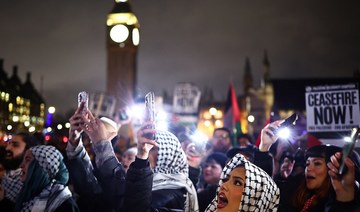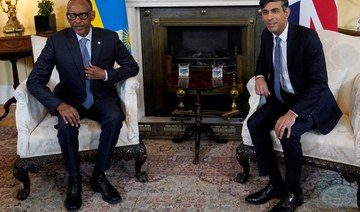MOSCOW: Belarus has introduced the death penalty for attempts to carry out acts of terrorism — charges faced by exiled opposition leader Svetlana Tikhanovskaya, who on Wednesday joined the United States in denouncing the decision.
Belarus — a close ally of Russia that has supported its military offensive in Ukraine — is the only country in Europe that continues to carry out executions despite calls for a moratorium.
“Lukashenko signed a law on the possibility of the death penalty for an attempted terrorist act,” Russia’s state news agency RIA Novosti reported on Wednesday, citing an online government portal for legal information in Belarus.
It said the law would come into force 10 days after its publication.
Two years ago, Belarus faced historic protests against the re-election of strongman leader Alexander Lukashenko, who has ruled the ex-Soviet country with an iron fist for more than two decades.
Thousands of activists were arrested in the crackdown and the key leaders of the opposition movement are now either jailed or in exile.
Among them is Tikhanovskaya, a political novice who ran against Lukashenko in the August 2020 polls in place of her jailed husband.
She now leads the Belarusian opposition from exile in Lithuania, while her husband Sergei Tikhanovsky is serving 18 years in prison on what supporters say are politically motivated charges.
Last March, Belarusian prosecutors charged Tikhanovskaya in absentia with “preparing acts of terrorism as part of an organized group,” according to Belarusian state news agency Belta.
Tikhanovskaya on Wednesday denounced the decision of the “lawless regime” to expand the use of the death penalty, saying it targeted anti-government activists.
“This is a direct threat to activists opposing the dictator and the war,” Tikhanovskaya tweeted.
“I urge the international community to react: sanction lawmakers and consider any tools to prevent the political killings,” she added.
The United States condemned the legislation, calling it a desperate move by Lukashenko to retain power.
“These actions are those of an authoritarian leader desperate to cling to power through fear and intimidation,” said Secretary of State Antony Blinken.
Belarus and its leadership are already under a litany of Western sanctions over its handling of the opposition protests and over its support for Moscow’s military campaign in Ukraine.
But many opposition activists remain behind bars in Belarus awaiting trial.
On Wednesday, a Belarusian court in the north-western city of Grodno started a closed-door hearing in the case against 12 activists accused of “preparing acts of terrorism,” according to Belarusian rights group Vyasna.
Among them is veteran activist Nikolai Avtukhovich, who has already served more than seven years in prison. The 59-year-old faces other charges, including treason.
The activists are accused of setting a policeman’s home and car on fire, and burning another policeman’s car in the autumn of 2020.
Capital punishment in Belarus — carried out by shooting — is highly secret and there are no official statistics.
The country’s last known death sentence was carried out against Victor Pavlov, who was arrested in January 2019 on suspicion of murder and larceny, according to the UN Human Rights Committee.
The committee had called for his execution to be halted while it examined his allegations of torture in detention but said in March that his family had been informed it had taken place, without any information about when he was executed.
Pavlov was the 15th person executed in Belarus since 2010 while their case was still pending before the committee, it said.
Belarus introduces death penalty for ‘attempted’ terrorism
https://arab.news/g88pq
Belarus introduces death penalty for ‘attempted’ terrorism

- Belarus is the only country in Europe that continues to carry out executions despite calls for a moratorium
- Lukashenko signed a law on the possibility of the death penalty for an attempted terrorist act
Bangladeshi students rally in solidarity with global student movement against Israel
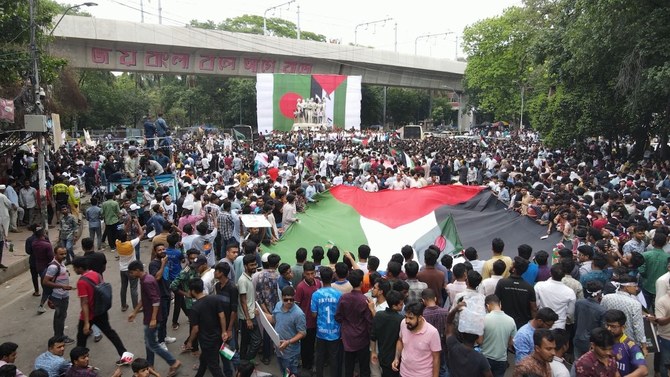
- US student protests have sparked more around the world, including in India, France, Australia
- Dhaka’s thousands-strong rally took place at Bangladesh’s largest, oldest tertiary institution
DHAKA: Thousands of people protesting Israel’s war on Gaza rallied at one of Bangladesh’s top universities on Monday in solidarity with the student-led protests and occupations sweeping the globe.
Pro-Palestinian student leaders and activists from different universities marched and carried flags of Bangladesh and Palestine, chanting slogans in solidarity with Gaza as they made their way to Dhaka University, Bangladesh’s largest and oldest tertiary institution.
Their protest culminated at the symbolic Aparajeyo Bangla sculpture, one of the most well-known landmarks dedicated to the Bangladesh Liberation War of 1971.
“Our stance is very clear: We express solidarity in support of a free Palestine state, in favor of a world free from war. And we support the demands made by US students, like divestment from Israel and other organizations that support the Israeli aggression,” Saddam Hussain, president of the organizing student group Bangladesh Students’ League, told Arab News.
They are also rallying in solidarity with the global student movement, he added.
“We believe all protests hold the same spirit of the youth, be it on the banks of the Atlantic or here on the bank of River Padma,” he said.
“The youths around the world have a common dream, and I urge all of them to move forward to make this dream come true. I hope all the youths of the world will join in this protest to build a world free from war, free and guided with humanitarian spirit.”
The Israeli strikes on Gaza that began in October have killed nearly 35,000 people in the Palestinian territory, mostly women and children. The leader of the World Food Program said over the weekend that parts of the Gaza strip were experiencing a “full-blown famine” that was spreading across the besieged enclave.
Students started to rally or set up tents at various universities around the US last month to protest Israel’s war on Gaza, sparking a global solidarity movement among the youth in India, Australia, France and elsewhere, with many putting pressure on their administrators and governments to cut ties with Tel Aviv.
While US colleges have seen protests since October, the unrest has escalated in recent weeks after police arrested pro-Palestine demonstrators at an encampment in Columbia University, sparking even more campsites at other campuses, as well as more crackdowns and arrests.
Unlike in the US, students in Dhaka were able to protest peacefully with scant police presence.
“The US and some other big players always speak in favor of freedom of speech. But what we have seen in the university campuses in the US is a shame for world leaders,” Solaiman Khan, a 23-year-old Dhaka University student, told Arab News.
“It’s a double standard. We, the youth (of Bangladesh), came out to the streets against this sort of hypocrisy from the superpowers of the world.”
Khan said the violence against Palestinians must be “stopped now and forever.”
“We have seen enough atrocities done by the Israeli forces. How many more lives must the world lose? Is it not enough?” he said.
“I think world leaders should come to their senses and act more rationally in stopping the atrocities in Gaza orchestrated by the occupying Israeli forces. Now is the time to play a decisive role. Otherwise, the next generation will not forgive us.”
Pro-Palestine Oxbridge students set up encampments

- They are demanding transparency about the universities’ financial links to Israel
- ‘We will not move until our demands are met’
LONDON: Students at the universities of Oxford and Cambridge have set up encampments in support of Palestine, The Times reported on Monday.
Around 50 have refused to leave the lawn of King’s College, Cambridge, while students have also declared a “liberated zone” outside Oxford’s Pitt Rivers Museum.
A banner hung outside King’s College read: “Welcome to the people’s university for Palestine.” Chants of “stop the bombing now” have also been heard on the campus.
The protests have been organized by Oxford Action for Palestine and Cambridge for Palestine.
They are demanding transparency about the universities’ financial links to Israel, which they have described as a “settler colonial state,” and are calling for the end of all investments and endowments from Israeli and Israel-linked companies.
“We have set up camp in university grounds, and we will not move until our demands are met,” the groups said in a statement, adding that the universities are legitimate targets for protests because of their “role in the British empire and its disastrous colonial legacies.”
The Times reported that protesters had been given an itinerary for their involvement including “de-escalation training” and “banner-making.”
A spokesperson for Cambridge University said it is for the college to decide whether to call the police, adding: “The university is fully committed to academic freedom and freedom of speech within the law and we acknowledge the right to protest.
“We ask everyone in our community to treat each other with understanding and empathy. Our priority is the safety of all staff and students.
“We will not tolerate antisemitism, Islamophobia and any other form of racial or religious hatred, or other unlawful activity.”
The relatively small UK protests come after nearly 2,000 people were arrested across the US after widespread demonstrations on over 130 American university campuses about Israel’s ongoing war in Gaza.
Muslim group issues UK Labour Party leader with demands over Gaza
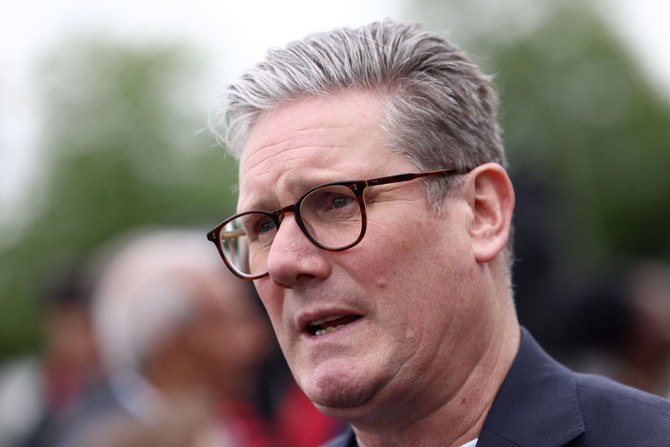
- Muslim Vote group calls for ‘real action’ to regain trust
- Support for Labour in recent local elections fell in areas with high Muslim populations
LONDON: Pro-Palestinian activists have presented a list of 18 demands to the leader of Britain’s opposition Labour Party and said they will not vote for the party at the next general election if he does not fulfill them.
The Muslim Vote, a campaign to get Muslim voters to back pro-Palestine candidates, has called for Sir Keir Starmer to promise to cut military ties with Israel, implement a travel ban on Israeli politicians involved in the war in Gaza and impose sanctions on companies operating in occupied territories.
The group told Starmer he must commit to “real action” and deliver on its requests if he was “serious” about his pledge to rebuild trust with those angered by his stance on the conflict in Gaza, The Telegraph reported.
Supporters would vote for the Green Party or Liberal Democrats if he could not commit to their demands, it said.
Labour’s campaign chief Pat McFadden acknowledged that Starmer’s approach to the conflict had cost the party votes at last week’s local elections. Support for Labour dropped dramatically in areas with a high Muslim populations, including Oldham in Greater Manchester, where the party lost overall control of the council in a shock defeat.
After the result, Starmer said he was determined to regain the trust of those who abandoned Labour as a result of his stance on the Gaza war but did not make any concrete pledges on the matter.
The Muslim Vote challenged Starmer with committing to the 18 demands and implementing them should he become the next prime minister.
They include removing the definition of extremism introduced by Secretary of State for Leveling Up, Housing and Communities Michael Gove and issuing guidance that allows Muslims to pray at school.
Philippines rules out use of water cannon in disputed South China Sea

- Philippines and China have clashed several times in disputed, resource-rich waterway
- Latest skirmish took place late last month, in an incident Manila describes as dangerous
MANILA: President Ferdinand Marcos Jr. said on Monday that Manila will not use offensive equipment in the disputed South China Sea, after China’s coast guard used high-pressure water cannon on Philippine vessels last week.
The Philippines and China have had several confrontations in the resource-rich area, where Beijing has used water cannon against Filipino vessels in incidents Manila has described as harassment and dangerous.
The latest in a string of maritime clashes occurred on April 30 as tensions continued to rise in the vital waterway that Beijing claims almost in its entirety despite a 2016 international arbitration ruling that rejected its assertion.
“What we are doing is defending our sovereign rights and our sovereignty in the West Philippine Sea. And we have no intention of attacking anyone with water cannons or any other such offensive (weapons),” Marcos said Monday.
“We will not follow the Chinese coast guard and the Chinese vessels down that road because it is not the mission of the navy (or) our coast guard to start or to increase tensions … Their mission is precisely the opposite, it’s to lower tensions.”
Philippine vessels have been regularly targeted by Chinese ships in areas of the South China Sea that are internationally recognized as belonging to the Philippines, which Manila calls the West Philippine Sea.
The Philippines’ Ministry of Foreign Affairs last Thursday summoned Zhou Zhiyong, China’s deputy chief of mission, after the incident left a Philippine coast guard vessel and another government boat damaged.
It was the 20th protest Manila has made against Beijing’s conduct in the South China Sea this year alone, while more than 150 diplomatic complaints have been made over the past two years.
Marcos said the Philippines will continue to respond to South China Sea incidents through diplomatic means.
Marcos’s statement comes days after the defense ministers of the Philippines, the US, Japan and Australia met in Hawaii and issued a joint statement on their strong objections to the “dangerous and destabilizing conduct” of China in the South China Sea.
UK considered Rwanda-style asylum deal with Iraq
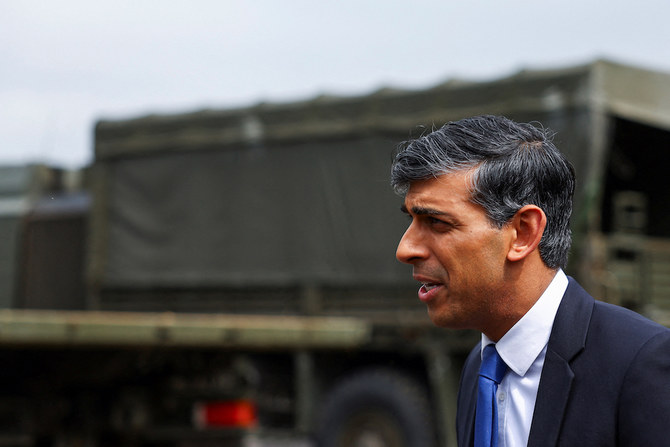
- Documents seen by Sky News reveal London has struck returns agreement with Baghdad
- They also suggest a desire to improve relations with Iran to return people to the country
LONDON: The UK considered sending asylum-seekers to Iraq for processing, new documents have shown.
Iraq is considered very dangerous, with the UK government advising against all travel to the country.
But a plan similar to the Rwanda scheme to process migrants in a third-party country was floated at one stage by Whitehall officials, with negotiations said to have achieved “good recent progress.”
The UK has struck a returns agreement with Baghdad for Iraqi citizens, which was achieved without a formal announcement or acknowledgement and a plea for “discretion,” the documents, seen by Sky News, suggest.
The cache of papers casts new light on the UK government’s approach to dealing with asylum-seekers and illegal migration, including a desire to improve relations with the Iranian Embassy in London in order to ease the repatriation of Iranian citizens, and moves to establish return agreements with Eritrea and Ethiopia.









